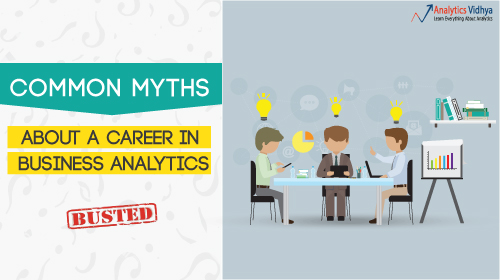Long time, I wrote a post about “How to start a career in Business Analytics?”. The post was well received by people looking to enter Business Analytics. Still one of the most popular posts about DataPeaker. In response to this post, I received a lot of inquiries about the career in Analytics. Although some of them were good inquiries, some of them were recurring myths.
Therefore, I decided to do a follow-up post. Not just like that, to completely debunk these myths, I decided to publish the posts in all the relevant forums.
These are the myths that I received through consultations / comments / emails and my opinion about them:
-
You must be an engineer to start a career in Business Analytics: The truth is that it is not like that. All you need is the ability to think structurally and be comfortable with number processing. As long as you can structure unstructured problems and perform calculations backwards, will be as good as any analyst.
Having said that, companies prefer people with quantitative backgrounds, since they are expected to be better with numbers. By quantitative training, I mean people from any of these disciplines: engineering, Economy, Math, Statistics, Physics or MBA with degrees in these fields.
- Analytics is about working with large data sets / Companies work with big data day after day: This optimistic outlook is far from reality in most Institutions. Experts estimate big data penetration to be in the low single digits among institutions. Most of the time, the analysis team works on specific problems, which may or may not involve large data sets. The requirement of the position is to be able to structure unstructured problems and to be able to use numbers to understand the business and the necessary changes in strategy.
- You need to be a programmer: He was a good C programmer ++ when I started my career in Analytics. Unfortunately, none of those skills have been used in recent 7 years and may not be used in the future. You only need to learn programming for the tool you use for your analysis (as an example, SAS, R, SQL, etc.), but you don't need to be a good programmer beforehand to learn this. At the same time, most of these tools have a graphical user interface (GUI), that you can start using without programming knowledge.
- Learning Analytics is about learning a tool (SAS / SPSS / another tool): A tool is just a tool for conducting analysis. Cannot perform analysis on its own. You must understand the arguments required to perform analyzes such as:
- What are the things to pay attention to when doing regression?
- What can be inferred from the coefficients and the result of the t-tests?
- How do you prove or disprove a business hypothesis?
Once you understand them, applying them through any tool can help you start your Analytics journey.
- It is difficult to find work – It's actually the other way around. The analytics industry is battling attrition and talent shortages. According to the McKinsey Global Institute (in a report from May 2011): "For 2018, only the United States could face a shortage of 140,000 a 190,000 people with deep analytical skills, as well as 1.5 millions of managers and analysts with the knowledge to use Big Data analytics to make effective decisions “. If you have the right skills, it will be highly sought (at least under current market conditions).
Are there other myths that you know? In case you are or you're not sure if it's a myth or a fact, add it below.







